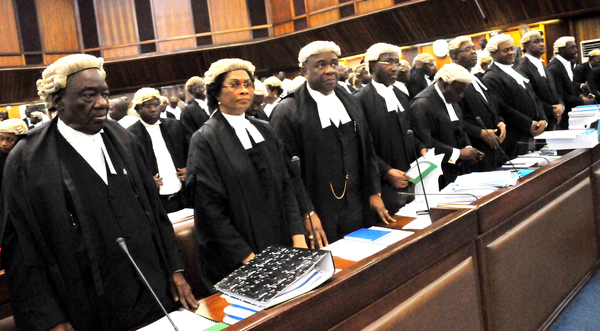Some Abuja-based lawyers have called for greater transparency and accountability from the judiciary sector in the 2017 budgetary allocation.
The lawyers spoke in separate interviews with the News Agency of Nigeria (NAN) on Wednesday in Abuja.
NAN recalls that President Buhari recently before the National Assembly announced that N100 billion was allocated to the judiciary in 2017 budget compared to N70 billion in the 2016 budget.
The lawyers, who also described the increase as a step toward a big turnaround for the sector, said that “more are expected from whom more are given’’.
A lawyer, Mr Moses Kalejaiye, said that budgetary challenges in the country had in the past affected the judiciary, especially on the welfare of staff.
He said that now that prayers were being answered, credibility, transparency and accountability remained the key word.
“It has always been an insufficient provision for the sector unlike the other arms of government.
“This sector needs enough funds in order to meet the required standard of justice expected in the country.
“With sufficient funds, I tell you, it will affect the rate of case disposal that we need to show that we are a just and equitable society.
“So, I personally think this is a step towards achieving that required goal; it is commendable I must say, but these monies must make physical impact.
“It must be used effectively in respective jurisdictions specifically for the entire system of justice.”
Mr Godspower Ike, another lawyer said that the increase, if used judicially, would make great impact in the sector.
Ike expressed discomfort over the impact of inefficient financial allocation to the sector in the past.
He said that the increase was however expected to give an effective performance to constitutional roles that must be accounted for “every step of the way’’.
“These are public funds, they must be accounted for; not just from the judiciary but from all the arms of government, ” Ike said.
Also speaking, Mrs Theresa Mbanifo, a lawyer and activist told NAN that the difference between the previous allocation and the present showed that a lot of considerations were put in place.
She said that this was enough reason for the system to clear all “unreasonable doubts” in its operations.
“It will help the image and integrity of the judiciary if it audits itself and make available reports on expenditure so that it can be easily interrogated,” she said.
According to Mbanifo, issues of welfare, not just of judges but entire staff of the system as well as improving infrastructure and general conducive environment remained paramount.
She urged that all the arms of government must however sit down to tackle the issue of judicial autonomy.
“This is very important because a judiciary that enjoys autonomy is an asset because it will be less corrupt, parochial and will also protect our democracy.
“It will also reduce judicial delays and barriers to the enforcement of judgments seriously,’’ she said. (NAN)

